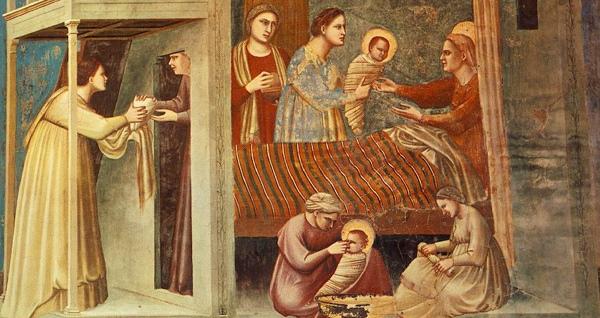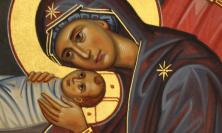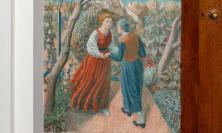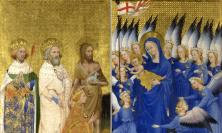For the Feast of the Birthday of Our Lady, Fr Harry Elias SJ encourages us to spend some time with the Mary whom we meet in the gospels: a true disciple, a model of faith and our Mother in the Church.
Matthew’s Gospel tells us that on a certain occasion while Jesus was speaking to the crowds, his mother and his brothers stood outside wanting to speak to him. When he was informed of this, Jesus replied, ‘Who is my mother, and who are my brothers?’ and, looking to his disciples, he answered his own question: ‘Here are my mother and my brothers! For whoever does the will of my Father in heaven is my brother and sister and mother.’ (Matthew 12:48-50, also Mark 3:33-35). The parallel passage in Luke’s Gospel has: ‘My mother and my brothers are those who hear the word of God and do it’ (Luke 8:21).
Luke presents Mary as fully meeting this criterion of discipleship. His estimation of Mary is found principally in his infancy narrative. She is the one favoured by God (1:28,30); the Holy Spirit will overshadow her to conceive him who will be called the Son of God (1:35); she is the obedient servant of the Lord (1:38). Elizabeth calls her ‘the mother of my Lord’ (1:43), and declares her blessed because of what God has done for her (1:42) and because of her faith that the word spoken to her would come to fulfillment (1:45). Mary rejoices in God, her Saviour: she acknowledges the greatness of what God has done for her, his lowly servant, and predicts that all generations will call her blessed (1:48). In her joy, Mary’s faith did not include a clear understanding of all the events, especially of the sorrows that lay ahead, but she treasured those events and pondered over them in her heart seeking to penetrate their meaning (2:19, 51).
In John’s Gospel, Mary is mentioned in two key places: at the wedding at Cana, the scene of the first of Jesus’s signs (2:1-11); and again when ‘all [is] finished’ and Jesus gives up his spirit (19:26-30). In the first instance, Mary’s care for the wellbeing of the guests prompts her to request that Jesus do something about the shortage of wine. At first she is met with the rebuff, ‘Woman, what concern is that to you and to me? My hour has not yet come.’ His mother did not take this as the final answer but accepted whatever Jesus would do, saying to the servants: ‘Do whatever he tells you.’ Even in his earthly life that was truly human (‘God sent his Son, born of a woman, born under the law’ [Galatians 4:4-5]), the will of the Father came first for Jesus (though it could include obedience to his human parents e.g. Luke 2:49-51!). Mary, too, would have to accept the primacy of God’s will over family ties. Yet Jesus did work that first sign at the wedding at Cana. Mary’s belief and persistence counted. As a true disciple, she trusted that Jesus had listened to her plea and would act on her behalf. She asked what she wished and left it to Jesus and to God’s will. Her wish was granted in abundance, a sign of the eternal life that Jesus had come to give us (John 10:10).
However, a faith which involves complete obedience to the word of God which transcends family ties is not possible until that word is proclaimed in its fullness: on the cross and through the resurrection and the sending of the Spirit. Both Mary and Jesus would be pierced for this – literally in the case of Jesus’s heart (John 19:36-37) and symbolically, though no less really, in the case of Mary’s soul (Luke 2:34-35). The final scene with Mary in John’s Gospel has her standing near the cross with two other women and the beloved disciple. Again Jesus addresses her as ‘Woman’, and announces the beloved disciple as her son and her as his mother. The beloved disciple ‘from that hour’ took her into his own home (John 19:25-27), a home where Jesus truly dwelt: ‘Those who love me will keep my word and my Father will love them and we will come to them and make our home with them’ (John 14:23). After handing over his mother to the beloved disciple, ‘Jesus knew that all was now finished’.
The Church would not be complete without Mary. The risen body of Jesus is the same earthly body that he received from Mary through her acceptance of God’s will. When Jesus’s hour had come – the hour of his passing over from this world to the Father (John 13:1) – the risen Jesus was then alive in Mary by the Holy Spirit, and so she not only continues in communion with her Son, but her mission as Mother is extended to all those in whom he now lives. Mary, as a mother, shares with us the pain of the piercings of our hearts, in our having to let go in small or big ways of whom and what we love. Still, even in the pinch of physical absence we can experience a growing communion with the loved ones we ‘lost’ and find ourselves serving them wherever and whenever we serve Jesus in others. Our loving relationships and the mission we have are never negated but become fulfilled.
Mary shares our rejoicing to God in being parents, not only of our own children but of all those he has given us to care for. With Joseph, her husband, she supplies us with the warmth and tenderness and support we need, coming in haste to us as she went to Elizabeth. She keeps an eye on our physical wellbeing as in the wedding feast of Cana and intercedes on our behalf. She reminds us to be courageously patient in our faith, mindful of God's faithfulness, his justice and mercy. She guides us in keeping God's will and devotes herself constantly in prayer with us as in the last recorded mention of her in scripture (Acts 1:14).
Harry Elias SJ assists in the Hurtado Jesuit Centre in Wapping, East London.






